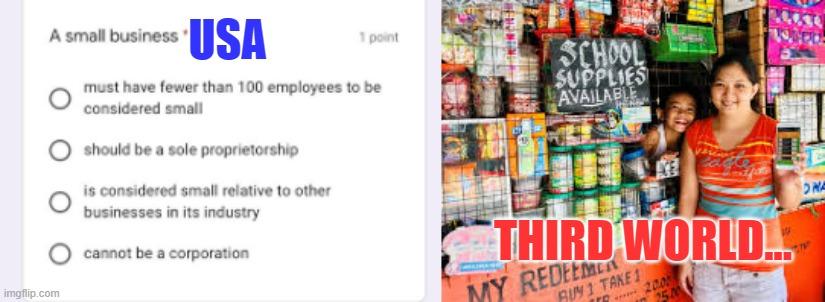
Small Business in the USA is so restrictive until you open your eyes to what an actual small business is. 100 Employees or less isn't SMALL, The photo on the right is a storefront in front of a home, and very common in the third world. Profits are thin, but it supplement income by employing cnt...
(media.greatawakening.win)
🔍 Notable

And they had a rule under Trump that a certain percentage of business had to go to “small” business. They would get my wife’s business all excited every year saying a huge mount of business was coming her wa They asked her to fill out all this paperwork and jump through a bunch of hoops and she would never hear again from them. They just needed small business to fill the forms to meet a quota. She did this for the first two years and then didn’t waste her time with it after that. It was a huge clusterfuck.
Yeah very sad... I dislike the Politician in Trump... You can't count to a Billion if you spend your entire life counting...
Stay-at-home family, mothers, grandmothers, other family members... This is larger than many, in rural areas there's a lot less merchandise for sale.
In the Philippines (Where this photo is from) These Sari Sari stores buy at retail, and there are even retailers who cater to these small businesses. They will sell at a retail price slightly cheaper than a regular shopping store. The BIR ( Bureau of Internal Revenue) doesn't come after the smaller rural Sari Sari because they are buying retail and the VAT tax is paid when they buy.
These stores will charge progressively higher prices depending on how remote. As an example, a bottle of Coke or Pepsi might be 25 Cents in the regular store, 24 cents in the Sari Sari store supplier, 26 cents in the in-town corner Sari Sari, and 28 cents in the Boonies. Keep in mind that transportation for the Sari Sari owners as well as their customers is more expensive the further out of town you go. Sales volume is far less as well.
Impressive knowledge of small business in the Philippines.
Plenty of other examples. Corner Bakeries, Tricycle drivers, Barbers, Nail Salons etc...
In the Philippines, the largest bill is 1,000 Php ($17.30), but no one will be able to cash that except larger shops and stores. Especially in the mornings. All the small people spend what they earned today to bring home food tonight. Little to no working capital.
Probably more than 10% of Homes have a Sari-Sari store, most out of business because of family pilferage in the house, and relatives and neighbors wanting credit. How do you tell Lola (Grandma) she can't have a cup of rice, a graham of salt, to a can of sardines when she babysat you and changed your diapers?
Giving Utang (Credit) kills small businesses. Better to have a shop away from family, friends, and neighbors.
We were in El Salvador last summer. Many roadside tiendas run by families.
Interesting thing is that we observed an entire network of bicycle and motorcycle based deliverers in the early morning. Very distributed and decentralized - I imagine the transporters are getting up at the buttcrack of dawn to be at some sort of farmer market or getting straight from growers, but they're making fresh deliveries in time for the tiendas to have food ready for the morning rush hour business.
It appeared to us to be a pretty well-oiled machine operating independent of government or corporations, and although nobody seems to be getting rich, a lot of people are making an honest living. Everyone seems to be hustling there. We were told most tiendas are tax exempt by virtue of the government just not bothering to enforce the laws down to their level.
Yeah, we would buy fish, chicken, and pork in the Wet Market in the Philippines just before daylight, much of it is fresher then, and the flies need sunlight.
There are also people selling from motorcycles as a one man business. Where our house is, 5K from town, you can go another 15K up in the Bukid (Mountain/country) So these gus will come by and supply Sari-Sari stores and individual customers as well.
Even children roam around when out of school or on weekends, holidays.. They typically sell snacks or fruits.
Some people specialize in a certain snack like sticky rice made into a candy wrapped in banana leaf,
Freezers are rare in the countryside, so there is money to be made selling ice. A cucumber sized chunk of Ice in a plastic bag. My wife's Nanay (Mother) went to the Elementary school with Ice Candy, which is powdered milk or koolaid with other ingredients, chocolate, coconut, fruit. etc.. She was charging 2 cents, and she might sell between 30-50 a day. These would typically be half an American Cool Pop sized.
Very hard to buy anything wholesale, you call up the company and they quote you retail.
I'll maintain that corporations as a form of business, need to go away. The further you get away from dealing in your neighborhood, the lower quality and higher the price gets.